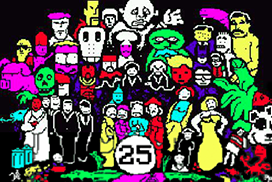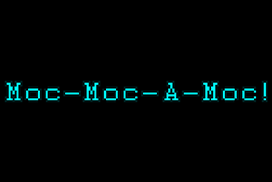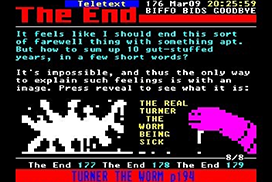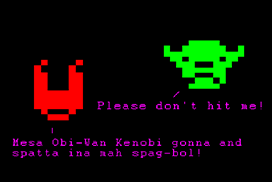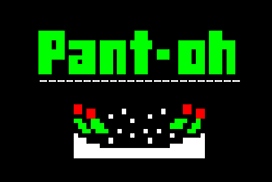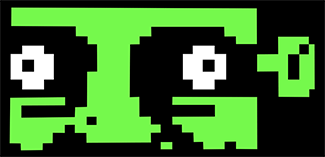
Page 28, press hold, and reveal. Digitiser's founder speaks out

|
Games are not books or films. Discuss
Edge #131, Christmas 2003
KA-BANG!!!!!!!!
Sorry, did that scare you? It did?! Then you should see a doctor: it was just a word, written on a page, and if your brain is interpreting it as a loud sound you really ought to get help. Who knows where such mental problems might lead? One day you may be reading an ornithological textbook and suddenly believe you're being attacked by swallows.
Or drakes.
Nevertheless, in the world of entertainment it's always preferable to start and often (unless you're Kurt Cobain) end things with a bang, or at the very least a rumble that builds to a coruscating roar before fading away to a moment of relative calm prior to spiking intermittently towards a thunderstorm climax, offset by a tranquil coda. It's a tease - a seductive glimpse of a pyrotechnic stocking, keeping your attention-buttocks gripped to the seat for the duration of whatever-it-is to come. In a narrative-led videogame particularly, such a tease - the James Bond pre-credits sequence, if you will - is not just advisable, it's an absolute must.
Take Sony's Primal. They can call it 'art' until their teeth fall out, but it boasts some of the most abysmal pacing ever seen in a game. Following some polished - if ultimately redundant - opening cut-scenes (themselves getting proceedings started by taking control out of the player's hands) we're treated to half an hour of following that irritating little demon guy around some achingly bland and hackneyed locations, during which absolutely nothing happens. You don't encounter any other living thing for almost 15 minutes.
To the best of my knowledge, games aren't books. Nevertheless, developers could learn a lesson or two from the words of best-selling author Elmore Leonard, whoever the hell he is. With regard to writing, the sage Leonard recommends simply: "cutting out everything, but the good parts". At first this appears to be one of those pieces of advice that are so obvious as to be worthless, and in isolation it could even be the words of a psychotic serial killer, advising exactly how to eviscerate a corpse. But I digress...
There's an increasing trend for developers to artificially extend the lifespan of games with needless padding. Not the sort of padding we got in the early-to mid-'90s, where everything was FMV sequences, and photographs of cats sprawled across griddles, but the sort of padding where you're expected to believe you're playing the game when in actual fact all you're doing is wandering from one event to the next. What's the better game: Sonic Adventure with its moping around town, or Mega Drive Sonic The Hedgehog with its relentless pace and action?
Cliched as it is, in almost exactly the same way nobody sets out to be bitten by a duck, or to get dragged into a bush by a grunting, half-naked tramp, nobody sets out to make a bad game. Oh, for sure, it's apparent some companies will instigate the creation of games just to shift the maximum number of units with the minimum of time, energy and money spent. And we all know who we're talking about.
But in my experience, on a shop floor level, game developers are by and large a decent and sincere bunch who try to do their best with the resources at hand. That said, it's frustrating to read interviews in which developers talk about games becoming more like movies, and that they're increasingly applying Hollywood techniques to game creation. This, frankly, is deluded guff. How many of these developers have actually studied film-making, or even bothered to read Robert McKee's 'Story' - the impenetrable screenwriting bible? Nine times out of ten, games pay mere lip service the ideal of the summer blockbuster, without actually looking at the fundamentals of movie-making. Putting the details of story aside for the minute - it's a whole separate debate - any screen narrative will collapse without a proper structure - and of late I've found myself becoming increasingly apathetic and bored by games featuring lazy structure and swathes of nothing to do.
People seem to be in unanimous agreement that Knights of the Old Republic is the best 'Star Wars' game in years. And it is (although that's a bit like saying 'Attack of the Clones' is the best film since 'Return of the Jedi').
The set-pieces, the fights, even the swoop racing are indeed all highly enjoyable, but before you get to them you have to spend far, far, far too long wandering along identikit corridors, or across the Dune Sea, or through the forests of Kashyyyk.
Yeah, there's an occasional random encounter to break up the tedium, but there's no escaping the uneasy feeling you're merely going through the motions, and being fooled into thinking you're getting your money's worth. The Wind Walker was another culprit, with an obscene amount of time spent getting from one place to another. And don't even get me started on the back-tracking in Metroid Prime.
Well, alright, do. It sucked.
For reasons we shan't go into, I watched a few consecutive episodes of 'Doctor Who' recently. It reminded me of Metroid Prime, with its repeated use of locations. In 'Doctor Who's case it was a budget issue - they couldn't afford more than a handful of eggboxes for sets. With Metroid Prime, who knows why we have to keep revisiting the same locations?
Admittedly, the whole exploratory element of Metroid Prime is part of the concept, but it continually drags you back and the world ends up feeling small.
For those of you who don't know, my day job is officially described as 'copper's nark'. However, I have another job: screenwriting. Recently, I wrote an episode of a kids series for ITV. Even on a show that is ostensibly aimed at a younger audience, structure is all.
Right up until the final draft there was a scene that everyone - myself, script editor, producer, executive producer - decreed to be the funniest and best-written scene in the script. The only problem was it had barely anything to do with any of the storylines. I found myself in the uncommon position of arguing for the scene to be taken out, and so eventually we did. Suddenly - and without knowing exactly why - the script as a whole just lifted and took off.
Not literally, that would be absurd.
If more developers applied the same principles to their games - taking out the elements that aren't strictly necessary to the game experience - the games would hopefully fly, and become more dynamic. If the game can survive without it, drop it. Don't start a journey without a map. Brush after every meal. Etc.
Games aren't books, and they're not films, but like both they require tight editing. Less isn't always more, but 'less crap bits where nothing happens' certainly is.
And with that, I bid you... BOOM!!!!
Mr Biffo is a semi-retired videogame journalist. His views do not necessarily coincide with Edge's
Do you know of any important moments from the annals of Digi history that have been omitted? If so, then mail me (superpage58@gmail.com) right now, man. Credit will be duly given for anything that gets put up.





